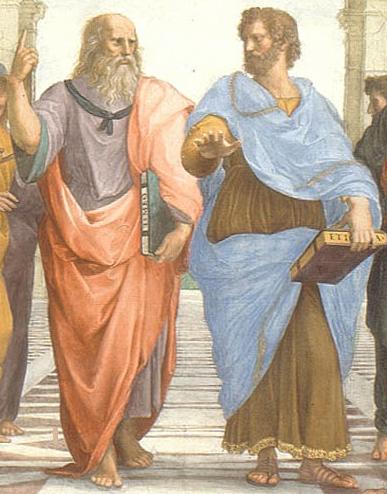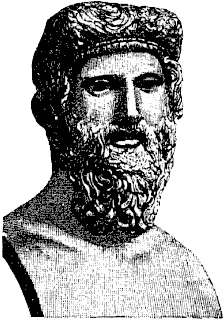Foundations and Assessment of Education/Edition 1/Foundations Table of Contents/Chapter 2/2.4.1
By Laira Stewart
Targets edit
| Targets |
|---|
| 1. Readers should be able to define the Socratic method |
| 2. Readers should be able to give an example of the dialectic method |
| 3. Readers should be able to describe Platos educational thought as outlined in The Republic |
| Read a short biography or read a more detailed one. |
Overview of Plato edit
Considered by historians to be one of the most influential minds of Western thought, Plato described the Socratic method of instruction and further developed this dialectic method in his later years. (Smith, 1997). The Socratic method is basically a learning method using a question and answer dialogue between the teacher and student. The idea is that the ensuing debate exposes flaws in reasoning and brings forth a better understanding of the issue. Plato improved on the Socratic method in his later years and developed a philosophy of education as outlined in The Republic that became the hallmark of a European liberal arts education.
427 to 347 BC. Plato was born in Athens in 427BC. When his father died, his mother married, Pyrilampes, a friend of Pericles. Plato began to pursue a political career, but became disillusioned with the politics of the time. Evidently, he was good at athletics, poetry and drama. In 409 BC he met Socrates, and according to Plato, he was one of Socrates more outstanding students. Socrates did not follow the then current trend of the Sophist method of teaching which used rhetoric or persuasion to dictate learning to their students. The Sophists asked high fees for their teaching while Socrates charged nothing. Plato, while mistrustful of the Sophists did share their interest in investigating values rather than physical science. In 399 Socrates was brought to trial for corrupting the minds of youth because of his skepticism regarding religious deities. He was convicted and sentenced to death. Socrates committed suicide rather than face execution. Plato wrote about the trial and Socrates decision not to try to escape from prison. After this Plato traveled extensively studying religion, geometry and astronomy. In 387 BC he returned to Athens and founded a university that included philosophy, physical science, astronomy and mathematics. Plato also developed a philosophy of education for prospective rulers requiring them to be philosophers first and rulers second as detailed in The Republic He is thought to have died at the age of 80 in 347 BC. (GradeSaver).
Socratic Method edit
Videos on Plato editThese links will take you to some very interesting videos about Plato and Socrates. 1. Watch this clip,Plato The Encyclopedia Channel. YouTube.
|
The Socratic method is a dialectic method of teaching, named after the Greek philosopher Socrates, in which the teacher uses questions to get the student to think about what he/she already knows and to realize what they do not know. This question and answer session stimulates the brain, engages the learner, and can bring new ideas to life. As one educator stated, Think of it as the relentless pursuit of truth through unceasing questions. To engage in dialectic method, establish your goal to clearly understand truth and get on with it. (Kern, 2008).
Today, law schools are trying to find better ways to teach their students the important concepts they will need in the future. The Socratic Method is one of the ways a lot of teachers have found to be most useful. Since the Socratic Method is the basis for which courts handle cases, it seems only fitting to have the students at a law school learn that way. In a court room a series of questions are asked to get the judge and/or jury to see the truth of the situation at hand. The teacher likes using the Socratic Method in their classes because they believe it helps the students get into the mind set of being a lawyer, plus they believe it helps the students learn and retain the information better. "One of the principle benefits that the Socratic Method confers is to allow large bodies of students to engage in "active learning." "Students learn better when they are actively involved in the learning process" rather than passively taking notes and the teacher dispenses information." (Jackson, 2007).
Dialectic Method Example edit
The benefits of this method are that the student becomes engaged in the learning process and contributes in developing the answers (led by the teacher). This is in contrast to didactic learning in which the teacher tells the student what they need to know.
Begin with a question that has several possible answers or is ambiguous so that you can begin asking the question in different ways until the students reason out the answer you wish them to learn. Then encourage them to ask themselves other responses.
For example: High School class discussion after reading the Noahs Ark story from the Old Testament:
Teacher: What is a covenant?
Possible answer: An agreement.
Teacher: I agree to meet you for lunch, is that a covenant?
|
Go to this link for a specific example that was used in a 3rd grade elementary math class. |
Possible answer: Sort of.
Teacher: What was the covenant God made to Noah?
Possible answer: God promised never to destroy the world by a flood.
Teacher: Does a covenant imply something more than an agreement?
Possible answer: A promise
Teacher: Yes, a covenant is an agreement with a promise. I make an agreement to meet you for lunch and I promise to be there no matter what.
Notice in this example the student has come up with the answer. If the teacher had simply told the student the definition of a covenant, chances are the student would simply not care to remember the meaning. In this example, the student is more likely to remember the meaning since he/she was involved in finding the answer.

Thoughts on The Republic edit
Plato believed that a teacher must care deeply for the student and have a good understanding of the subject being taught. In The Republic Plato outlines a lifelong learning process for rulers that begins with learning to read, write and do mathematics at age six. As the child grows music and sports are added. At age 18 military services are added. At age 30 the ruler should study philosophy and politics. It is not until age 50 that the ruler should rule. This lifelong liberal arts education would ensure that the ruler had experience and wisdom in order to make just decisions. The Republic is mostly about defining justice and the different types of justice. Only a philosopher-King can dispense the appropriate justice. This method of instruction became useful during the Middle Ages in the royal classes, and can be seen in the British royal family today. The British males are required to do military service, attend university, and work in civil service for many years before they take over the role of King. An interesting note is that the current Queen of England, Elizabeth, was reluctant to hand over the reins to Phillip until after he had a wife and family, and has not yet retired. (Jowett)
Here are some other interesting links on Plato editThese links will take you to some very interesting videos about Plato and Socrates. 1. Click this link, Plato Biography Kraut.
|
Summary edit
Both the Didactic and Dialectic methods are necessary for teaching. There are many times when telling the student what he/she needs to know is the only way to impart information. However, the dialectic method is essential for engaging students in interactive learning, in giving them some ownership of discovery in the learning process. The dialectic method can provide an opportunity for debate of issues, exploration of ideas and use of higher thinking skills. Since the object of learning is to be able to discern and make decisions based on knowledge, the dialectic method is critical for growth of knowledge.
References edit
- Anderson, Ronald D. (1994). Issues of Curriculum Reform in Science, Mathematics and Higher Order ...office of research, [Abstract]. US #Department of education. Retrieved from http://books.google.com/books?id=hwmb_mqZgVQC&pg=PA44&lpg=PA44&dq=teach+by+asking+instead+of+telling&source=web&ots=WnZ-otfmkT&sig=chknfZ02MSgDTPQj0-oUwTU7XBY&hl=en&sa=X&oi=book_result&resnum=10&ct=result#PPA44,M1
- Garlokov, Rick. The Socratic Method:Teaching by Asking Instead of by Telling. Retrieved September 22, 2008, from http://www.garlikov.com/Soc_Meth.html
- GradeSaver. Plato. (n.d.) Harvard College. Retrieved October 5, 2008, from http://www.gradesaver.com/classicnotes/authors/about_plato.html
- How Stuff Works. A Discovery Company. Ancient Greece: Socrates and Plato. (n.d.) [Video File]. Video posted to http://videos.howstuffworks.com/hsw/25880-ancient-greece-socrates-and-plato-video.htm
- Jackson, Jeffrey D. ,Socrates and Langdell. (May 17, 2007). Legal Writg: Is the Socratic Method a Proper Tool for Legal Writg Courses?. California Western Law Review, Vol. 43, No. 2, pp. 267–308, Available at SSRN: http://ssrn.com/abstract=986343
- Jowett, Benjamin. The Republic by Plato. Available from http://classics.mit.edu/Plato/republic.html
- Kemerling, Garth. (Last updated on 9 August 2006). Plato. Philosophy Pages. Retrieved October 5, 2008, from http://www.philosophypages.com/ph/plat.htm
- Kern, Andrew. Two Methods of Instruction. Articles from The Classical Teacher. Retrieved September 22, 2008. http://www.meuimoriapress.com/articles/twoinstuct.html
- Kraut, Richard. (March 20, 2004). Plato. Stanford Encyclopedia of Philosophy. Retrieved October 5, 2008, from http://plato.stanford.edu/entries/plato/
- Plato. (n.d.) The Internet Encyclopedia for Philosophy. Retrieved September 22, 2008, from http://www.iep.utm.edu/p/plato.htm
- Smith, Mark K. (First published May 8, 1997. Last update: April 11, 2008). Plato. From http://www.infed.org/thinkers/et-plato.htm
- University, of Chicago, The Law School. The Socratic Method (n.d.) Retrieved September 22, 2008, from http://www.law.uchicago.edu/socrates/method.html
- YouTube. (July 13, 2008). Plato - Encyclopedia channel. (n.d.) [Video File]. Video posted to http://www.youtube.com/watch?v=1aWK_69ufbo
- YouTube. (August 22, 2008). Pacific McGeorge School of Law Faculty on the Socratic Method. (n.d.) [Video File]. Video posted to http://www.youtube.com/watch?v=p9B_zYs_ZhY
Questions edit
1. Plato's foremost contribution to education was:
- Teaching royalty the proper way to dress
- Use of the dialectic method
- Use of the didactic method
- Writing about Socrates life
2. An example of the dialectic method is:
- Asking students what they know about widgets
- Telling student about how a widget works
- Telling students the history of the widget
- Telling students why widgets are necessary
3. The best way to explain Plato's educational ideal for a ruler as outlined in The Republic is:
- A philosopher has the knowledge needed to bestow justice.
- A philosopher should advise the king or ruler.
- Justice can only be learned by hard work.
- Justice is wasted on the old.
4. What is not an essential ingredient for the success of Plato's method.
- Asking a question
- Caring about the student
- Deep knowledge of your subject
- Explain the answer
Answers edit
- b
- a
- a
- d
 |
Rate This! |  |
